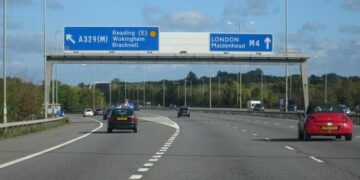THE COMPANY behind the borough’s recycling facilities has defended the decision to start charging households for dumping their DIY waste.
Re3, which runs the centres in Reading and Bracknell on behalf of Wokingham Borough, Reading Borough and Bracknell Forest Borough, said that the waste from DIY projects is NOT household waste.
The company said in a statement, which we print in full below, that their definition of non-household waste is “the types of waste that would normally form the fabric of a property, and thus would not be taken with the owner when moving house”.
They added: “re3 chargeable items – soil and rubble, asbestos, plasterboard – fall under this category.”
However, this is at odds with the Government guidelines, which we printed last week: “DIY waste from residents is classified as household waste and so should be disposed of without a charge.”
And, confusingly, guidelines from the charity WRAP (Waste and Resources Action Programme) supports both positions.
Re3 is correct in the WRAP considers the construction and demolition waste from households is NOT household waste under as the Environmental Protection Act of 1990. But the WRAP guidance adds: “DIY waste is classed as household waste if it results from work a householder would normally carry out”.
However, in a letter that the DCLG [Department of Communities and Local Government] sent to Storrington and Sullington Parish Council last month, they confirm that the “that waste disposal sites should not be charging for household DIY waste in any rate” and that charges should be for waste such as car tyres, construction and demolition items.
A re3 spokesperson said: “DIY is a commonly used and understandable term, but it has no legal standing when applied to waste management.
“Waste such as rubble is deemed to be ‘non-household’ regardless of whether it is from the property or home of a resident. Another way of looking at it is to consider that non-household waste is the types of waste that would normally form the fabric of a property, and thus would not be taken with the owner when moving house. re3 chargeable items – soil and rubble, asbestos, plasterboard – fall under this category.”
Although there has yet to be a legal challenge to the definition of DIY waste, BBC News reported last month that Hampshire County Council could be involved in one.
Cllr Rob Humby from the council told BBC News: “It could certainly end up as a legal battle. We hope we don’t get there and come to a resolution.”
Wokingham Town councillor Colin George is one of those concerned about the charges and intends to raise the matter with DCLG [Department of Communities and Local Government] minister Marcus Jones MP and Wokingham MP John Redwood.
He said: “The council and re3 seem to be prepared to go around in circles whereas I was very specific regarding the use of the words ‘construction’ includes improvement, repair or alteration, where there is a householder doing DIY tasks in their own home and the resultant waste being classed as industrial waste.
“The DCLG stated that the waste from ‘household’ DIY should not be charged for where that DIY waste is generated by work a householder would normally carry out.”
Cllr Lindsay Ferris, leader of the Liberal Democrats on Wokingham Borough Council, said that the party across Wokingham and Reading intends to challenge re3’s interpretation of the law.
He said: “We shall jointly write to DCLG attaching a copy of the re3 press release to find out what that department thinks of their comments.
“Re3 continue to talk about non-household waste. They admit themselves that their definitions are not clear. We have specifically talked about DIY-Household waste, not non-household waste. The question is whether DIY-household waste is household waste, or non-household waste. As there is considerable confusion, we believe that this issue needs to be resolved at National level.
“As there is considerable doubt associated with the charging for this area, we believe the only sensible thing to do is to stop charging until the issue is resolved. It would be incredibly embarrassing for the three Councils to be told that they have been charging illegally, after the point where considerable doubt had been raised.
“If they continue to charge for DIY-waste after this point and it is subsequently found that the charges were found to be illegal, then we have no alternative than to ask for (and expect) the resignation of those individuals involved in any such decision within re3 and across the three Councils.”
What re3 has said about DIY waste charges:
A re3 spokesperson, on behalf of the three Councils, has said:
“re3 introduced a charging system for some types of non-household waste at the end of September 2016. Though the legal capacity to introduce such charges has existed for several years, the decision was finally taken by re3 at a time when many Council budgets are facing severe challenges and where there is a real need to make essential savings in waste management to support other core services. Since their introduction, the new arrangements at re3 recycling centres have worked well. The re3 Councils would like to thank residents for their support and understanding of why these charges, and the other changes brought in during 2016, were needed.
“re3 would also like to address some recently expressed concerns on the charging system and its legality. It is clear that there is some confusion around the terminology used. DIY is a commonly used and understandable term, but it has no legal standing when applied to waste management.
“The relevant legislation classifies certain types of waste as falling outside the legal definition of household waste. The 2016 service changes at recycling centres by re3 are applied to those types of waste.
“Waste such as rubble is deemed to be ‘non-household’ regardless of whether it is from the property or home of a resident. Another way of looking at it is to consider that non-household waste is the types of waste that would normally form the fabric of a property, and thus would not be taken with the owner when moving house. re3 chargeable items – soil and rubble, asbestos, plasterboard – fall under this category.
“Government departments have recently released statements on this issue. The Department for Environment Food and Rural Affairs (Defra) has confirmed in the House of Commons that “local authorities can charge for the deposit of ‘non-household’ waste”. The Department for Communities and Local Government (DCLG) has also confirmed in correspondence that “local authorities can of course charge for disposal of non-household waste such as car tyres and construction and demolition waste”. The use of the phrase “construction and demolition waste” is a direct reference to the legislation. The definition of construction states that it includes “improvement, repair or alteration”. We know that some visitors to the recycling centres improve, repair or alter their homes and gardens, and bring us the resulting non-household waste.
“Finally, it is helpful to consider some operational guidance from the Waste and Resources Action Programme (WRAP) on charging. Although not formal legal advice, WRAP advises that “materials for which charges can be levied” include the waste types for which re3 charges: inert material such as rubble and concrete, bricks and roof tiles; plasterboard; soil and any other building materials. It is also worth noting that in looking at this carefully and seeking to be balanced, re3 has not introduced charges for the entire list of materials (such as doors, windows, fitted kitchens, fitted wardrobes) that WRAP identifies.
“The charging system applies to a small range of materials only, is non-profit making, has been calculated to cover the cost of disposal and is part of an efficiency and savings programme introduced to protect council taxpayers from unnecessary waste management costs.”



















































